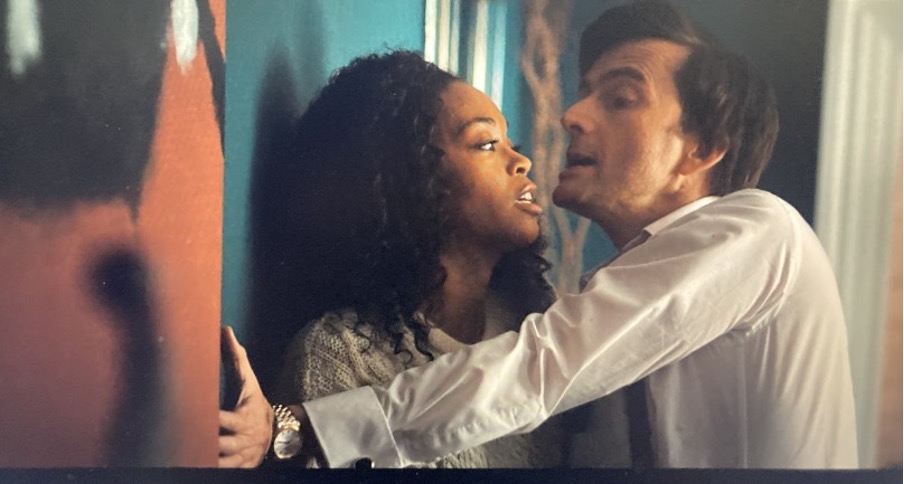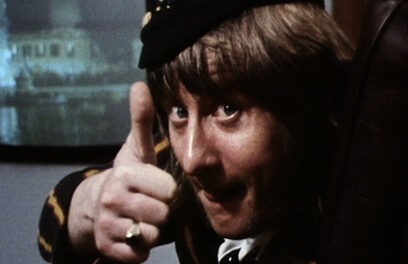Warning: This article is divided into two parts but both have detailed descriptions of sexual violence in the book and TV series, Rivals.
In episode one of the 2024 television period drama Rivals, middle-aged Lizzie Vereker (Katherine Parkinson) tells her new 20-year-old neighbor, Taggie O’Hara (Bella Maclean), “It’s 1986. You can have whatever you want—so Cosmo tells us”.[i] This line captures the myth of the 1980s “superwoman”—clad in shoulder-padded power suits, she was told she could “have it all”: a successful career, a happy home life, and a fulfilling sex life.[ii] Yet Lizzie’s sardonic addendum—“so Cosmo tells us”—reveals her own disillusionment. Trapped in an unhappy marriage with a philandering husband, Lizzie’s career as a romance novelist has been sidelined by the demands of motherhood, relentless domestic chores, and her husband’s cruel jabs about her ageing appearance.
Based on Jilly Cooper’s 1988 bestseller of the same name,[iii] Rivals is set in the fictional English village of Rutshire (a nod to “rutting”, which, for our American readers, is British slang for sex). The main plot involves a battle for control of an ITV franchise (Corinium Television) and the romantic entanglements (most of them adulterous) among its staff and Rutshire’s residents. Like the works of Judith Krantz, Shirley Conran, and Jackie Collins, Cooper’s novels were dubbed “bonkbusters”—glamorous, sex-filled sagas featuring independent female protagonists.[iv] But unlike traditional romance novels, bonkbusters did not shy away from bad sex: adulterous, disappointing, taboo, or even violent. As Burge et al. note, “If romance offers sexual fantasy, the bonkbuster relishes sexual realities”.[v] However, despite depicting sexual violence and coercion, these novels often portrayed such encounters as inevitable, even for powerful women, and failed to explore their traumatic aftermath. Instead, blame was frequently placed on the victim, portrayed as either “frigid” or as having provoked their assailants through suggestive clothing or behaviour.
On the surface, the 2024 adaptation of Rivals is, as many media outlets describe it, “delightfully naughty”.[vi] The series amps up the erotic content of the novel, pairing it with a nostalgic 1980s soundtrack and fashion that has both inspired and been inspired by the recently revived “Boom Boom” trend—an homage to what has often called “the decade that style forgot”.[vii] With its scenes of cutthroat corporate ambition, decadent alcohol-fuelled lunches, and plentiful extramarital affairs, the series evokes the spirit of classic ‘80s primetime soap operas like Dynasty and Dallas—both of which the women in Rivals admit to watching. Yet this is no simple period piece. Updated for a twenty first-century audience, the series reexamines the sexual politics of Cooper’s original text through a post-#MeToo lens.[viii] The misogyny, casual sexual violence, and normalized harassment that the novel sometimes glamorized or brushed aside are now critiqued more explicitly. However, as this essay will explore, the television adaptation is not without its own blind spots and at times, it reinforces some of the very stereotypes it sets out to challenge.
Rivals opens in 1986, the same year a landmark UK court ruling first recognised sexual harassment as a form of workplace discrimination. However, it was not until the 2010 Equality Act that sexual harassment was both explicitly defined and legally prohibited.[ix] In Jilly Cooper’s original novel, the workplace culture at the fictional Corinium television network—presided over by the domineering and bullying (and aptly named) Lord Tony Baddingham—routinely treats its female employees with open contempt. Women are referred to as “slags” and “bitches”, subjected to leering, groping, and inappropriate comments from male colleagues, and they are expected to interpret such behaviour as flattering or harmless.
As Louise Jackson notes, “this was an era in which sexual innuendo and unsolicited touching in the workplace was trivialised as banter or fun, reinforced through popular TV sitcoms such as On the Buses (1969-73) and Are You Being Served? (1972-85), whilst nude ‘pin up’ calendars were common on workplace walls”.[x] The Sun newspaper, for instance, continued publishing its topless “Page 3 Girl” feature (launched in 1970, perhaps in reaction to the rising second-wave feminist movement) until 2010. Rupert Murdoch, the paper’s owner, described the feature as “old-fashioned” entertainment.[xi] Against this cultural backdrop, Cooper’s novels have drawn criticism for favouring their male protagonists who are rarely held accountable for their misogynistic or at times violent attitudes and actions. In a 2019 interview, Cooper expressed scepticism toward the #MeToo movement, claiming it was “diminishing” men, and she suggested that “secretly, women, although they want to be in the ascendancy, are quite attracted by the idea of a dominant male.”[xii]
Published in 1988, Rivals features Cameron Cook—a twenty-something white American television producer and the mistress of Tony Baddingham — who is repeatedly described by male colleagues as a “ball breaker” and “bitch” whom they all hope to “tame”. In the 2024 television adaptation, Cameron has been reimagined as African American and, notably, without the father complex Cooper used in the novel to explain her attraction to older, domineering men—men who, as the narrator crudely puts it, would “like to screw all that smouldering bad temper out of her.”[xiii] In one particularly disturbing moment in the novel, Charles Fairbourne, another male colleague, advises newcomer Declan O’Hara that Cameron might actually benefit from physical violence: “If she had someone really strong to slap her down, there’d be no stopping her.”[xiv]
By the end of the novel, this foreshadowed violence materialises. Furious that Cameron has slept with his rival, Rupert Campbell-Black, Tony assaults her: he kicks her in the ribs, gives her a black eye, and throws her about his office. And yet, when she later takes refuge at Rupert’s home, Cameron defends her abuser, saying, “He [Tony] had provocation. You’d probably have done the same thing under the circs”.[xv] Tony echoes this sentiment in his own apology: “I shouldn’t have beaten you up, but I love you and just saw red”.[xvi] Cameron, seemingly unfazed, even rationalises staying with him, thinking, “It was nice to have Tony as a bolthole in case Rupert started playing her up”.[xvii] No one reports the assault to the police. Instead, the narrative frames the incident as a kind of emotional climax—something that draws Cameron and Rupert closer. Rupert is portrayed as charmed by her new “intense vulnerability”.[xviii] Even Declan, the self-proclaimed champion of the oppressed, remarks: “A lot of people will feel Tony was justified. He was only acting in the heat of the moment”.[xix] Cooper’s novel seems to reflect—and, arguably, reinforce—the widespread “blame the victim” attitudes toward domestic and sexual violence that predated but were still prevalent in the 1980s (and sadly, still today). After all, this was the decade when popular soaps like General Hospital turned a rape storyline involving Luke and Laura into a beloved romance, culminating in a fairytale wedding, and when Dynasty glossed over Crystal Carrington’s marital rape by Blake with a bouquet of roses.[xx] In Rivals, not a single character—including Cameron herself—holds Tony accountable for his violence.
In the 2024 TV adaptation, however, Cameron (Nafessa Williams) is not presented as the powerless—or undeserving—victim portrayed in Cooper’s novel. When Tony (David Tennant) hits her the first time, he is not allowed a second blow; instead, Cameron strikes back and ultimately knocks him out with the golden TV award that sits atop Tony’s desk. Nevertheless, an earlier encounter between the couple that was detailed in Cooper’s book has only slightly been altered for the series, and though it alerts Cameron to Tony’s potential for violence, it also seems to sexually excite her. In the scene as originally written, after returning home from the O’Hara’s New Year’s Eve party, Cameron finds Tony waiting for her, accusing her of having sex with Declan’s son whom he saw kissing her at the stroke of midnight. In the novel he throws a glass of whiskey at her face and grabs her by her hair, making her “terrified he was going to hit her”. When he “jabbed two fingers up inside her”, Cameron “winced” and tells Tony she’s tired and “can’t” have sex. In reply, Tony insists that she “can” if she wants to be promoted to Controller of Programmes, immediately making her change her mind.[xxi] Episode three of the TV version does not improve matters, as Cameron’s consent is still coerced and the added dialogue suggests her own arousal. Although Tony doesn’t hit her, he does pin her against the wall and place his hand under her dress, and despite telling him to stop, when he offers her the promotion, she replies, “Then you better fuck me as hard as you can”, thus transforming what begins as a violent coercion of a subordinate employee into a sexually exciting encounter for the couple.

Fig. 1: Tony uses sexual coercion as seduction in Rivals, episode three. Screengrab by Julie Anne Taddeo
While the period details in the TV version of Rivals may make us nostalgic for Cameron Cook’s designer power suits and magnificent stilettos, viewers are hopefully appalled that her co-workers feel entitled to audibly mumble “slag” or post notes with sexual innuendos on her office door to undermine her authority at work. Meanwhile, both in public and private, her boss and lover, Tony Baddingham, relishes reminding her that it was he who flew her over from New York on the Concorde, and he can send her back whenever he so chooses. Watching such scenes with my nineteen-year-old daughter, I am thankful that her reaction has been, “that’s harassment” or “that’s rape”—yet viewers like me who still remember the 1980s may think, “who would have believed us, or cared, if we complained?”
Part Two of this essay will look at other moments from Rivals, set around the workplace as well as in the homes of Rutshire’s residents, and how updating these scenes for modern viewers reminds us of how far we still need to go before making such attitudes and practices truly things of the past.
Julie Anne Taddeo is Research Professor of History at University of Maryland, USA. She is the co-author (with Katherine Byrne) of Rape in Period Drama Television: Consent, Myth, and Fantasy (2022). Her other publications include articles and edited collections on such topics as Steampunk; the British author Catherine Cookson; and period drama television and masculinity. Her current projects include an edited collection on the portrayal of the British National Health Service on television and a podcast series, with Katherine Byrne, on period drama television
References
[i] Rivals, Disney+, Happy Prince Production, UK, 2024.
[ii] Linn Spencer Hayes, “The superwoman myth,” Social Casework 67.7 (1986): 436-441.
[iii] Jilly Cooper, Rivals (London: Bantam Press, 1988, original edition); New York: Forever, 2024, Kindle version is referenced in this article.
[iv] David Barnett, “Trash, bang, wallop: How the bonkbuster novel came to define a generation for millions of women,” Independent, 17 August 2019, https://www.independent.co.uk/independentpremium/long-reads/bonkbuster-novel-literature-books-1980s-jackie-collins-a9006446.html, accessed 23 June 2025.
[v] Amy Burge, Jodi McAlister, and Charlotte Ireland, “Prince Charming with an Erection”: The Sensational Pleasures of the Bonkbuster”, Contemporary Women’s Writing 17:2 (July 2023): 137-155.
[vi] Jeanine T. Abraham, “Series Review: Hulu’s Rivals is A Delightfully Naughty Romp Worth Binge-Watching,” Medium, 27 October 2024, https://medium.com/@visableblackwoman/series-review-hulus-rivals-is-a-delightfully-naughty-romp-worth-binge-watching-f585baba5aaf, accessed 26 June 2025.
[vii] Morwenna Ferrier, “Boom boom culture: fashion’s flashy, sleazy and sudden vibe shift,” The Guardian, 27 March, 2025, https://www.theguardian.com/fashion/2025/mar/27/boom-boom-culture-fashion-flashy-sleazy-sudden-vibe-shift, accessed 24 June 2025.
[viii] MeToo is a social movement and campaign against sexual violence, particularly sexual harassment and assault, where individuals, primarily women, share their experiences of such encounters. It initially started in 2006 as a grassroots effort by Tarana Burke, but gained widespread attention in 2017 after the hashtag #MeToo went viral on social media.
[ix] For a brief history of sexual harassment laws in the UK, see Louise Jackson, “Making sexual harassment history: the UK context,” Gender Equalities at Work, 24 June 2021, https://www.genderequalitiesat50.ed.ac.uk/2021/06/24/making-sexual-harassment-history-the-uk-context/, accessed 23 June 2025.
[x] Ibid.
[xi]Lisa O’Carroll, Mark Sweney and Roy Greenslade, “Page 3: The Sun calls time on topless models after 44 years” The Guardian, 20 January 2015, https://www.theguardian.com/media/2015/jan/19/has-the-sun-axed-page-3-topless-pictures, accessed 25 June 2025.
[xii] Clarisse Loughrey, “Jilly Cooper says #MeToo movement has ‘diminished’ men,” The Independent, 30 January 2019, https://www.the-independent.com/arts-entertainment/books/news/jilly-cooper-author-men-diminished-metoo-feminism-a8753946.html, accessed 25 June 2025.
[xiii] Jilly Cooper, Rivals, Kindle edition, 2024, p. 12.
[xiv] Ibid, p. 101.
[xv] Ibid, p. 452.
[xvi] Ibid, p. 456.
[xvii] Ibid, p. 457.
[xviii] Ibid, p. 459.
[xix] Ibid, p. 455.
[xx] For a discussion of 1980s soap operas and their treatment of rape, see Mary Buhl Dutta, “Taming the Victim: Rape in Soap Opera,” Journal of Popular Film and Television, 27(1): 34–39.
[xxi] Ibid, pp. 238-241.





